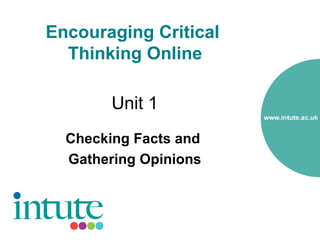
Critical Thinking Unit 1 Question A2 Plato Slide Share
- 1. Encouraging Critical Thinking Online Unit 1 Checking Facts and Gathering Opinions
- 2. In which year was the philosopher Plato born? • Find three websites that provide an answer • Fill in the boxes on the worksheet for each of them • Comment on any notable features of the sites or answers you discover
- 3. In which year was the philosopher Plato born? • Many sources give a date around 428 or 427 BCE • See, for example, the biographies of Plato from – The Philosopher’s Lighthouse – The European Graduate School
- 4. Extracts from The Philosopher’s Lighthouse and the EGS website http://library.thinkquest.org/18775/plato/biop.htm and http://www.egs.edu/resources/plato.html Retrieved 6 August
- 5. Extracts from The Philosopher’s Lighthouse and the EGS website http://library.thinkquest.org/18775/plato/biop.htm and http://www.egs.edu/resources/plato.html Retrieved 6 August
- 6. In which year was the philosopher Plato born? • But it’s not hard to find sites that give dates ranging from at least 430 to 423 BCE – Bristol University course description – Australian Psychological Society newsletter
- 7. Extracts from Bristol University course description and APS newsletter http://www.bristol.ac.uk/philosophy/current/undergrad/pastunits/units0506/plato.html and http://www.groups.psychology.org.au/Assets/Files/paig_newsletter_1999.pdf Retrieved 6 August 2008
- 8. Extracts from Bristol University course description and APS newsletter http://www.bristol.ac.uk/philosophy/current/undergrad/pastunits/units0506/plato.html and http://www.groups.psychology.org.au/Assets/Files/paig_newsletter_1999.pdf Retrieved 6 August 2008
- 9. In which year was the philosopher Plato born? • Many sites will indicate that there’s some uncertainty – By preceding the date with ‘around’, ‘ca.’, ‘circa’ or similar – By giving a range of dates – e.g. 428/7 BCE
- 10. In which year was the philosopher Plato born? • However, many sites just give an unqualified date – St Andrews University Plato summary – UsefulTrivia.com even gives a month • Surprisingly few sites indicate the full extent of the uncertainty
- 11. Extracts from St Andrews University website and UsefulTrivia.com http://www-groups.dcs.st-and.ac.uk/~history/Mathematicians/Plato.html and http://www.usefultrivia.com/biographies/plato_001.html Retrieved 6 August 2008
- 12. Extracts from St Andrews University website and UsefulTrivia.com http://www-groups.dcs.st-and.ac.uk/~history/Mathematicians/Plato.html and http://www.usefultrivia.com/biographies/plato_001.html Retrieved 6 August 2008
- 13. In which year was the philosopher Plato born? • Some sites even contradict themselves – Bookrags.com’s extract from the Encyclopedia of World Biography – A previous version of the Wikipedia article on Plato, online for at least several months in 2008
- 14. Bookrags.com: Extract from Encyclopedia of World Biography http://www.bookrags.com/biography/plato/ Retrieved 4 June 2008
- 15. Bookrags.com: Extract from Encyclopedia of World Biography http://www.bookrags.com/biography/plato/ Retrieved 4 June 2008
- 16. Wikipedia article on Plato from 2008 http://en.wikipedia.org/wiki/Plato Retrieved 4 June 2008
- 17. Wikipedia article on Plato from 2008 http://en.wikipedia.org/wiki/Plato Retrieved 4 June 2008
- 18. Further questions to consider • What reasons are given for accepting one date rather than another? • In your view, which date has the best claim to be the correct answer? Why is this?
- 19. Summary - key things to note • The precise answer to a question is not always known – But sources don’t always acknowledge that this is the case – Important qualifications can get omitted • Caution and cross-checking of facts are vital
- 20. Why might we find conflicting answers to a question? • There may be real uncertainty about the answer • Authorities may disagree • There may be multiple ways of interpreting a question
- 21. Why might we find conflicting answers to a question? • Some sources may be more up to date than others • Answers may vary in precision • Some sources may simply be wrong
- 22. Questions to ask when assessing sources • Who is the author? – An individual or an institution? – What are the author’s credentials? • Is this a scholarly resource, or a more informal one? • How up to date is this source?
- 23. Questions to ask when assessing sources • Are there reasons to doubt the reliability of this source? – Does it include information I know to be false? – Does it contradict itself or use poor reasoning? – Is it biased towards a particular view?
- 24. Questions to ask when assessing sources • Is the information provided confirmed by other sources? – Are references provided? – Do other websites agree? (A major advantage of the Web is that many sources can be compared quickly and easily.)
- 25. Remember the three Ws • WHO wrote this site? – Is the author a trustworthy source? • WHEN was it written? – Is it up to date? • WHY was it written? – Does the author have an axe to grind?
- 26. This slideshow is part of Encouraging Critical Thinking Online, a set of free teaching resources designed to develop students’ analytic abilities, using the Web as source material. For the full set, please visit Intute Training: http://www.intute.ac.uk/training/
